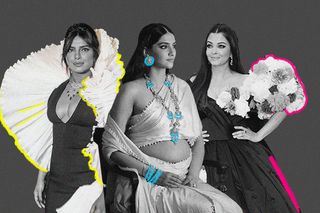
The Hate Against Maternity Shoots, Celebs Who Dress ‘Too Young,’ Ends Up Dehumanizing Women
The trend of scrutinizing every look of celebrities is also telling of society’s unhealthy obsession to look “perfect.”

Sonam Kapoor’s latest maternity shoot, snapshots of ivory and white, received a lot of love from both fans and her co-celebrities. Buried under birthday wishes and comments filled with heart emojis, however, were remarks that criticized her for a variety of things.
On the one hand, she was shamed for not looking pretty enough and for baring her “tond (paunch)” — almost as if women aren’t allowed to present their bodies in designer clothes if they aren’t flaunting the on-vogue body type. Yet another picture of her lying on the beach has someone deriding the way she looks. On the other hand, Kapoor was also criticized for copying Rihanna — as though pregnant women never appeared in pictures before 2022 and pregnant celebrities never did maternity photoshoots until Rihanna came up with the novel idea herself.
The unabashed vitriol is revelatory of the way we engage with women, motherhood, and gender norms that would much rather keep pregnant women away from the public gaze. It is also telling of society’s entitlement to the bodies and body-related decisions of people who, at the end of the day, are absolute strangers to them. Not to mention, the exercise ends up dehumanizing women by treating them as mere “bodies.”
This hostility is not nearly the same as fashion critics critiquing a look; as long as their commentary is respectful and limited to the celebrity’s make-up and attire, of course. Instead, what happens increasingly often is that fans and editors alike end up almost dehumanizing the celebrity, in question, under the garb of “constructive” criticism or “objective” opinions. Case in point: Voice of Fashion’s article last month, which garnered a lot of well-deserved flak from netizens, for saying something as absurdly entitled as: “Aishwarya Rai’s botox is not our problem… But how female celebs choose to age or are expected to becomes our fuss fare as she continues to twirl and wave like a young beauty queen.” Basically, the writer deemed it fit to condemn Rai for not dressing up in age-appropriate clothes, further perpetuating ageism in the process.
This very week, in fact, Priyanka Chopra was trolled for her looks at a Bulgari event — first, for wearing a dress that seemingly highlighted what some called her “already broad shoulders;” the second time, for wearing a gown, which appeared to resemble pencil shavings from a sharpener. The latter comment had its moment of internet fame due to the humor embedded in it, of course. And actually, rather than focusing on flawing Chopra’s body, it poked fun at the design itself which is, at the end of the day, fair game for critique.
Related on The Swaddle:
How Celeb Weddings and Pregnancies Were Reframed to Keep Women in the Limelight — At a Cost
However, fashion humor is not always limited strictly to fashion — it often crosses over into offensive territory. Commentary on the dress, pose, and make-up can easily become a channel for meanness towards the bodies of women. The internet feels at ease — and even entitled — in making observations about one’s nose, eyebrows, lips; basically, about anything and everything.
It is at this juncture that it becomes important to reflect upon the way we engage with these jokes and the ripple effect that may have. At the end of the day, the jokes come from a place of famous people not fitting into our rather narrow (pun intended) standards of conventional beauty. Case in point: Vidya Balan being compared to a rhinoceros for her weight, Deepika Padukone being called an “anorexic wannabe” and a “dead body” also for her weight, and Anushka Sharma’s face being likened to the Guy Fawkes-mask, which most of us saw on V for Vendetta.
The degree of humiliation is murky and stark, showing just how much a person is valued based on their appearance. From criticizing the sweat beads on Padukone’s face at Cannes last month to slamming female actors for choosing to wear red at their Indian weddings simply because “we’re so done” with the look — it’s almost as if the audiences have shapeshifted into being those stereotypical parents who admonish their children for scoring 99% on their tests instead of 100%.
While bashing celebrities for not living up to our ceaselessly-evolving standards of beauty reeks of entitlement, the trend of scrutinizing every look of theirs is telling of society’s unhealthy obsession to look “perfect,” in perpetuum. In doing so, though, we don’t just hurt the self-esteem of the celebrity we’re targeting; we also end up creating yet another toxic archetype in a world where women are already buried under impossible beauty standards.
“There’s a thin line between wanting to look pretty and becoming obsessed with perfection,” reads a 2014 article in Cosmpolitan, explaining that “for some women, it creates a compulsive obsession with looking perfect … the feeling like something’s always a little off. Call it ‘beauty dysmorphia.'”
Related on The Swaddle:
India’s Miss Universe Victory Shouldn’t Take Away Focus From Beauty Contests’ Toxic Culture
Arguably, this hate against celebrities often stems from anxieties about seeing women defy expectations around how they are supposed to look. The anxieties, then, manifest as hate in the form of conspiracies, criticism, and conjecture, thus completing the cycle of dehumanization. The woman’s personhood is taken away in an attempt to reduce them to bare bones, and bare bodies.
It is entirely possible that the very same celebrities who are targeted by the public may have had a role to play in bolstering the restrictive beauty standards through fairness cream ads, airbrushed pictures on magazines and social media, or even “catty” digs at their co-actors. Perhaps, it’s easier, then, to justify our remarks at them by saying “serves them right!”
However, for women who don’t fit into the mold of beauty that we’re trying to uphold by criticizing the celebrities, the message we end up sending is that their looks are “inferior” — and worse, their bodies are outliers. For people who may resonate with the bodies of the celebrities that we’re so hellbent upon disparaging, there is a collective attack on self-perception, making a whole generation watching this hate vulnerable to self-esteem and body image issues, if not eating disorders.
So, in giving celebrities a taste of their own medicine — which isn’t a great justification for the hate, to begin with — what we’re actually doing is participating in a disservice to society by perpetuating the same toxic standards we’re berating the very same celebrities for having furthered.
Devrupa Rakshit is an Associate Editor at The Swaddle. She is a lawyer by education, a poet by accident, a painter by shaukh, and autistic by birth. You can find her on Instagram @devruparakshit.
Related


The World’s Biggest 4‑Day Work Week Trial Program Begins in the UK
